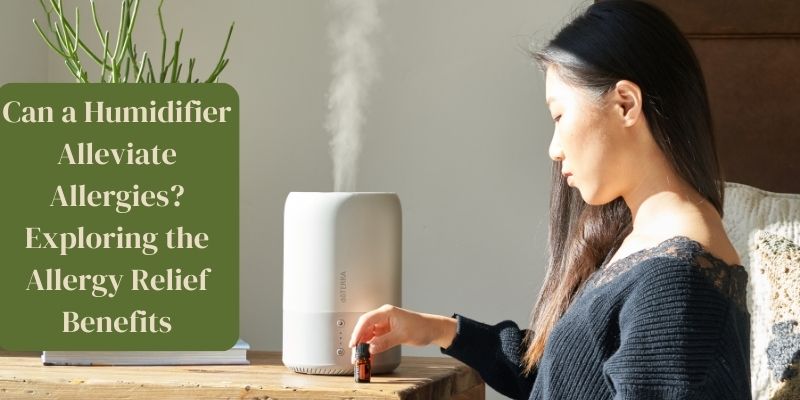Allergies can be a pesky and uncomfortable part of life for many people. The sneezing, itchy eyes, and congestion can make even the simplest tasks feel like a struggle. While there is no magic cure for allergies, one question frequently arises: Can a humidifier alleviate allergies? In this article, we will discuss the potential benefits of using a humidifier to combat allergies and explore the science behind it.
Understanding Allergies
Before we dive into the role of humidifiers in allergy relief, it’s crucial to understand allergies themselves. Allergies are the body’s immune system’s response to substances called allergens. Common allergens include pollen, dust mites, pet dander, and mold. When exposed to these allergens, some individuals’ immune systems overreact, leading to allergy symptoms.
Allergy Symptoms
Common allergy symptoms include:
- Sneezing
- Runny or stuffy nose
- Itchy or watery eyes
- Coughing
- Wheezing
- Skin rashes
- Fatigue
These symptoms can significantly impact an individual’s quality of life, particularly during peak allergy seasons.
The Role of Humidifiers
Now, let’s explore how a humidifier might help alleviate allergy symptoms. A humidifier is a device that increases indoor humidity levels by emitting moisture into the air. While it cannot directly combat allergens, it can have several beneficial effects on allergy sufferers:
Moisturizing Nasal Passages: Dry indoor air can exacerbate allergy symptoms by drying out nasal passages. This dryness can make it easier for allergens to irritate the respiratory system. A humidifier adds moisture to the air, helping keep nasal passages moist and reducing irritation.
Reducing Airborne Allergens: Humidity levels influence the concentration of airborne allergens. In excessively dry air, allergens like dust mites and pollen can remain suspended, making it easier to inhale them. Increasing indoor humidity levels can cause these allergens to settle, reducing their presence in the air.
Relieving Dry Throat and Cough: Allergy-related coughing and throat irritation can be exacerbated by dry air. A humidifier can help soothe a dry throat and minimize coughing by maintaining adequate humidity levels.
Enhancing Sleep: Improved air quality resulting from the use of a humidifier can lead to better sleep. Adequate sleep is crucial for maintaining a strong immune system and reducing the body’s sensitivity to allergens.
Choosing the Right Humidifier
To maximize the allergy-relief benefits of a humidifier, it’s essential to select the right type and maintain it properly. Here are some key considerations:
Type of Humidifier: There are different types of humidifiers, including cool mist, warm mist, ultrasonic, and evaporative. Each has its advantages and disadvantages. Cool mist humidifiers are often recommended for allergy relief because they do not heat the water, minimizing the risk of mold growth.
Cleaning and Maintenance: Regularly clean and maintain your humidifier to prevent mold and bacteria buildup. Using distilled water can also help reduce mineral deposits and maintain air quality.
Humidity Control: Invest in a humidifier with adjustable settings to control indoor humidity levels effectively. Ideally, you want to maintain a humidity level between 30% and 50%.
Allergen Reduction: Some humidifiers have built-in features like HEPA filters or UV-C lights that can help further reduce airborne allergens.
Conclusion
While a humidifier may not directly cure allergies, it can be a valuable tool in managing allergy symptoms. By adding moisture to indoor air, reducing airborne allergens, and alleviating dryness-related discomfort, humidifiers can provide significant relief for allergy sufferers.
Remember that individual responses to humidifiers may vary, so it’s essential to consult with a healthcare professional if you have severe allergies or underlying respiratory conditions. To make the most of your humidifier, choose the right type, maintain it properly, and monitor indoor humidity levels diligently. When used correctly, a humidifier can be a valuable ally in the battle against allergies, helping you breathe easier and enjoy a more comfortable life.
You may also like:
Understanding Allergic Reactions: How Long Do They Last?
Can Allergies Cause Body Aches?
Can Allergies Cause Chest Pain?
FAQs
Q:- Can any type of humidifier help with allergies?
Ans:- While different types of humidifiers are available, cool mist humidifiers are generally recommended for allergy relief. They disperse room-temperature water vapor without heating it, reducing the risk of mold growth and effectively adding moisture to the air to alleviate allergy symptoms.
Q:- Is it possible to over-humidify a room with a humidifier?
Ans:- Yes, over-humidification can occur if you use a humidifier excessively. It’s essential to maintain indoor humidity levels between 30% and 50%. Levels above 50% can promote mold growth and dust mite proliferation, potentially worsening allergy symptoms.
Q:- Can a humidifier completely eliminate allergens from the air?
Ans:- No, humidifiers do not eliminate allergens from the air. However, they can help reduce airborne allergens’ concentration by causing them to settle. To effectively reduce allergen exposure, combine the use of a humidifier with other strategies like regular cleaning and dust mite covers on bedding.
Q:- Are there any risks associated with using a humidifier for allergy relief?
Ans:- The primary risk associated with humidifiers is mold and bacteria growth in the water reservoir and mist output. Regular cleaning and maintenance, using distilled water, and following the manufacturer’s instructions can mitigate these risks. Additionally, excessive humidity levels can lead to mold growth in the home, so it’s crucial to monitor humidity levels closely.
Q:- Can children and pets be in a room with a humidifier running?
Ans:- Generally, it is safe for children and pets to be in a room with a properly maintained humidifier running. However, it’s essential to ensure that the humidifier is out of their reach to prevent accidental spills or tampering. Additionally, maintain humidity levels within the recommended range to prevent any discomfort or health issues for your loved ones.
